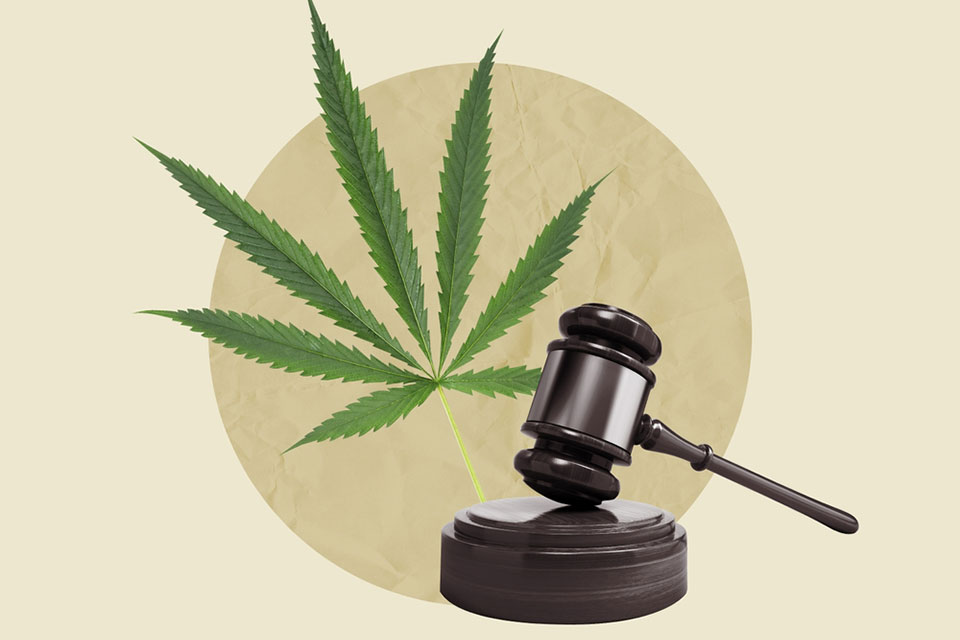A ruling from the U.S. Supreme Court could add a new layer of risk for CBD manufacturers. On Wednesday, the court determined that a trucker could bring a claim against a CBD company under the Racketeer Influenced and Corrupt Organizations Act (RICO) when he failed a drug test after using the company’s products, which led to him losing his job.
Douglas Horn claimed he was seeking relief from accident-related chronic pain. According to the court’s opinion, he said he purchased and began taking “Dixie X,” which was marketed as a THC-free, nonpsychoactive CBD tincture produced by Medical Marijuana Inc.
“A few weeks later, however, Horn’s employer selected him for random drug screening, and Horn tested positive for THC. After he refused to participate in a substance abuse program, his employer fired him,” the opinion stated.
The ruling is a departure from previous RICO cases, which relied on the part of the Act that said damage had to occur to “business or property.” Horn’s case was centered on personal injury.
However, Horn brought the case under RICO because he believed that losing his job could be defined as economic harm. He argued that Medical Marijuana’s false or misleading advertising satisfied the elements of mail and wire fraud and that those crimes constituted a “‘pattern of racketeering activity.’”
“While this case focuses on a claim that a CBD provider might be liable for its misrepresentation under RICO, this holding is not limited to CBD product manufacturers,” Charles Gormally of Brach Eichler told Green Market Report. “Thus, any manufacturer of products placed in the marketplace with express representations should take note that SCOTUS will allow claims against them for misrepresentation and even RICO violations if a plaintiff has suffered damage to their business or property.”
Finer points
The case received mixed rulings as it made its way through the lower courts. First, Medical Marijuana Inc. prevailed, with a lower court deciding that Horn lost his job for taking a THC product, not for actions undertaken by the company. The Second Circuit reversed that decision, saying Horn was injured by losing his job.
In the 5-4 decision, the court expanded the type of civil actions that can be brought under a federal racketeering statute, asserting that claims stemming from personal injuries are redressable if they can be shown to have caused economic harm.
Justice Amy Coney Barrett wrote the majority opinion, which was joined by Justices Sonia Sotomayor, Elena Kagan, Neil Gorsuch and Ketanji Brown Jackson.
In affirming the Second Circuit’s judgment, Barrett wrote, “The phrase ‘injured in his business or property’ does not preclude recovery for all economic harms that result from personal injuries.”
She added: “If the owner of a gas station is beaten in a robbery, he cannot recover for his pain and suffering. But if his injuries force him to shut his doors, he can recover for the loss of his business. In short, a plaintiff can seek damages for business or property loss regardless of whether the loss resulted from a personal injury.”
The decision is a powerful one, in part because it increases the damages that may be awarded to people using it to claim personal injury.
“RICO is a potent weapon in many litigation matters because if a plaintiff prevails on such a claim they are entitled to recover their attorney fees AND three times the amount of damages sustained,” Gormally said.
The dissent was written by Justice Brett Kavanaugh and joined by Chief Justice John Roberts and Justice Samuel Alito. That opinion warned that adopting the rule advocated by Horn would effectively circumvent RICO’s exclusion of personal injury suits in plain violation of Congress’ intentions.
Amicus briefs
Several amicus briefs were filed on behalf of CBD companies in the case. Law360 reported that in July, the Washington Legal Foundation argued that the Second Circuit had ignored RICO’s structure and purpose.
“Congress limited the reach of criminal and civil liability not through separate lists of predicate offenses but through separate provisions creating criminal and civil liability,” the foundation’s brief said. “Civil RICO actions are limited to only direct injuries to business or property. If any predicate offense does not cause direct injury to business or property, Congress thought it best to leave RICO’s enforcement to the Department of Justice.”
The American Association for Justice, an advocacy group for trial attorneys, also filed an amicus brief, according to Law360, backing the plaintiff and arguing that Horn was not alleging a personal injury from ingesting the CBD products but instead that he lost his job directly because of the companies’ purportedly unlawful actions – making it exactly the kind of claim for which RICO was intended.
2264000-2264334-23-365_6k47 mmj hornThe decision expands the application of the RICO Act to include certain personal injury situations. Read More


